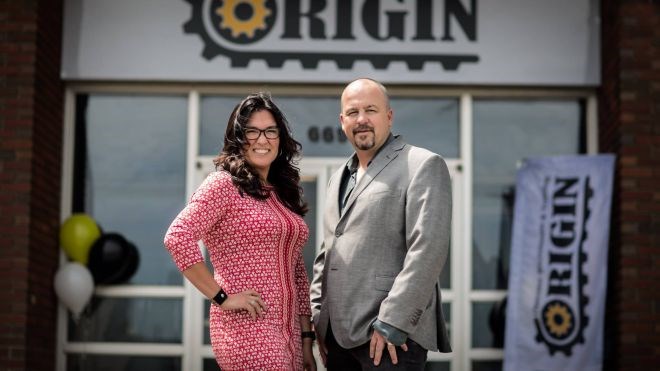This past year prompted Paul and Melissa Giles to reassess the way their award-winning First Nation training and recruitment firm did its business.
Since setting up shop six years ago, the husband-and-wife owners of Origin Operator Recruitment and Training have been wildly successful in steering approximately 150 people toward paying careers.
The couple own four Caterpillar-made heavy equipment simulators and frequently trailer them into First Nation communities across Northern Ontario as a tool to unearth hidden talent, screen them for training purposes, build confidence, and match prospective employees to companies in need of skill.
But the simulators weren’t generating a steady stream of revenue.
“Industry wasn’t really stepping up to the plate,” said Paul Giles.
Instead of companies contracting with them to supply them with trainees, it was the host communities they were invoicing.
Together with a new partner and part-owner in Byron LeClair, they’ve rejigged the business model to supply semi-skilled on-demand labour while also acting as First Nation engagement specialists.
“Our goal is to change that revenue model over to industry instead of it being placed on the shoulders of the First Nations.”
It’s been a year of evolution for the growing 18-employee company which once operated out of a portable trailer on the Fort William First Nation before moving into dedicated office space in Thunder Bay last June.
At the annual Nishnawbe Aski Development Fund awards dinner in Timmins in October, Melissa and Paul took home the Partnership Award given to business where at least one of the partners is of Aboriginal heritage.
LeClair worked 27 years at Pic River First Nation, negotiating labour and project deals in forestry, energy and mining before departing earlier this year to start his own consulting business.
“If a company wants to position themselves to leverage the First Nation community engagement piece, we would actively go there and do that for them,” said Giles.
Introducing the simulators is a great icebreaker for industry to get locals involved.
“We use that trailer to get a captive audience to engage them and then we can say, this is the project, here are the opportunities - equipment operator, labourer, catering, whatever else is involved, and we can still do our training pieces. But our focus is more on the revenue stream to get companies to hire us to do that engagement.”
On the personnel side, Origin can supply industry with basic grunt labour, flaggers, welders and equipment operators, all safety certified.
The company has 11 employees in the field and has 30 to 40 semi-skilled workers available on-call.
They use the simulators to bring back former trainees to upgrade their skills.
“We hit a plateau in 2016 where we reinvested in our capacity,” added Giles. “Now we have a better and more clearly defined services and revenue model that we can go out and do those things that we were trying to do.
“Byron has been a huge asset in helping us structure things. He's a doer and a pragmatist.”
He and LeClair are working together at developing those business opportunities.
“We have a couple of contracts with contractors to set up joint ventures,” said Giles, mentioning projects with New Gold in Fort Frances and the Greenstone Gold project near Geraldton.
“There’s no real ceiling (for the company). I love that we got involved with those simulators and we sweated it out. These (machines) are expensive and it was hard to make a business out of it.
“But now that we’re using them as engagement (tools) and we’re getting contracts to do that and we’re employing people, it’s just a no-brainer.”




